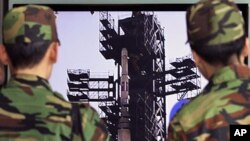The Obama administration is urging China to help convince North Korea to abandon its planned ballistic missile launch. There are new concerns that North Korea may also be planning another nuclear test.
State Department spokeswoman Victoria Nuland said the United States continues to urge all countries that may have influence on North Korea - most notably China - to use that influence to make clear that they also disapprove of the planned missile launch and believe it will further isolate Pyongyang.
As for Washington's message about the launch, Nuland said it is simple: Don't do it.
"North Korea's launch of a missile would be highly provocative. It would pose a threat to regional security," said Nuland. "And it will be inconsistent with its recent undertakings to refrain from any kind of long-range missile launches."
The most recent of those undertakings was a February agreement with the United States to resume nuclear inspections in exchange for food aid. That deal was broken by Pyongyang's announcement that it will launch a weather satellite in the next few days aboard an Unha-3 rocket.
South Korean intelligence photos, obtained by VOA, also show what appear to be preparations for a third North Korean nuclear test.
While she would not confirm that intelligence information, Nuland said another nuclear test "would be equally bad if not worse" than the missile launch.
North Korea says launching a weather satellite is a purely civilian operation. But Nuland says U.S. negotiators made clear that any ballistic missile use would be a deal breaker.
"They can't launch the thing without using ballistic missile technology, which is precluded by U.N. Security Council resolution 1874. So regardless of what they say about it, it's still a violation," Nuland said.
U.S. officials hoped for more from this first deal negotiated with North Korea's new president, Kim Jong Un, who took power following his father's death in December.
Victor Cha is the Korea Chair at the Center for Strategic and International Studies in Washington. While North Korea's new president is thought to be assisted by top generals and an uncle, Cha says it would be a mistake to conclude that this decision came from anyone but the president himself.
"The political culture of this place is such that any decision of national significance has always been taken by one person, and that is the direct descendant of the Kim Il Sung line," said Cha. "And so I think while he [may] have people around him who are helping him, in the end decisions are being made by this 28-year-old."
Cha says the decision to break the February deal must be seen in light of North Korea's long pursuit of nuclear weapons.
"Even though this may look like puzzling behavior, we have to think of it as part of a systematic program really that is decades-old to try to get to the point where they can deliver nuclear-tipped missiles anywhere in the world and basically try to achieve, in their own minds, the ultimate security umbrella," Cha added.
With North Korea's determination to press ahead with its nuclear program, Cha says the resumption of six-party talks to resolve the dispute appears a long way off. "I don't think we are going to see any sort of return to the negotiations any time soon," Cha said. "If anything, I think the situation could get worse from here."
Talks between North Korea, the United States, China, Russia, South Korea and Japan broke down in 2009, when Pyongyang expelled international inspectors before conducting its second nuclear test.
Stemming North Korea's nuclear ambitions will be part of talks in Washington Wednesday and Thursday, when U.S. Secretary of State Hillary Clinton hosts foreign ministers from the Group of Eight leading industrialized nations.
News
US Urges China to Convince N. Korea to Scrap Missile Launch









